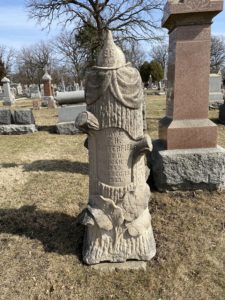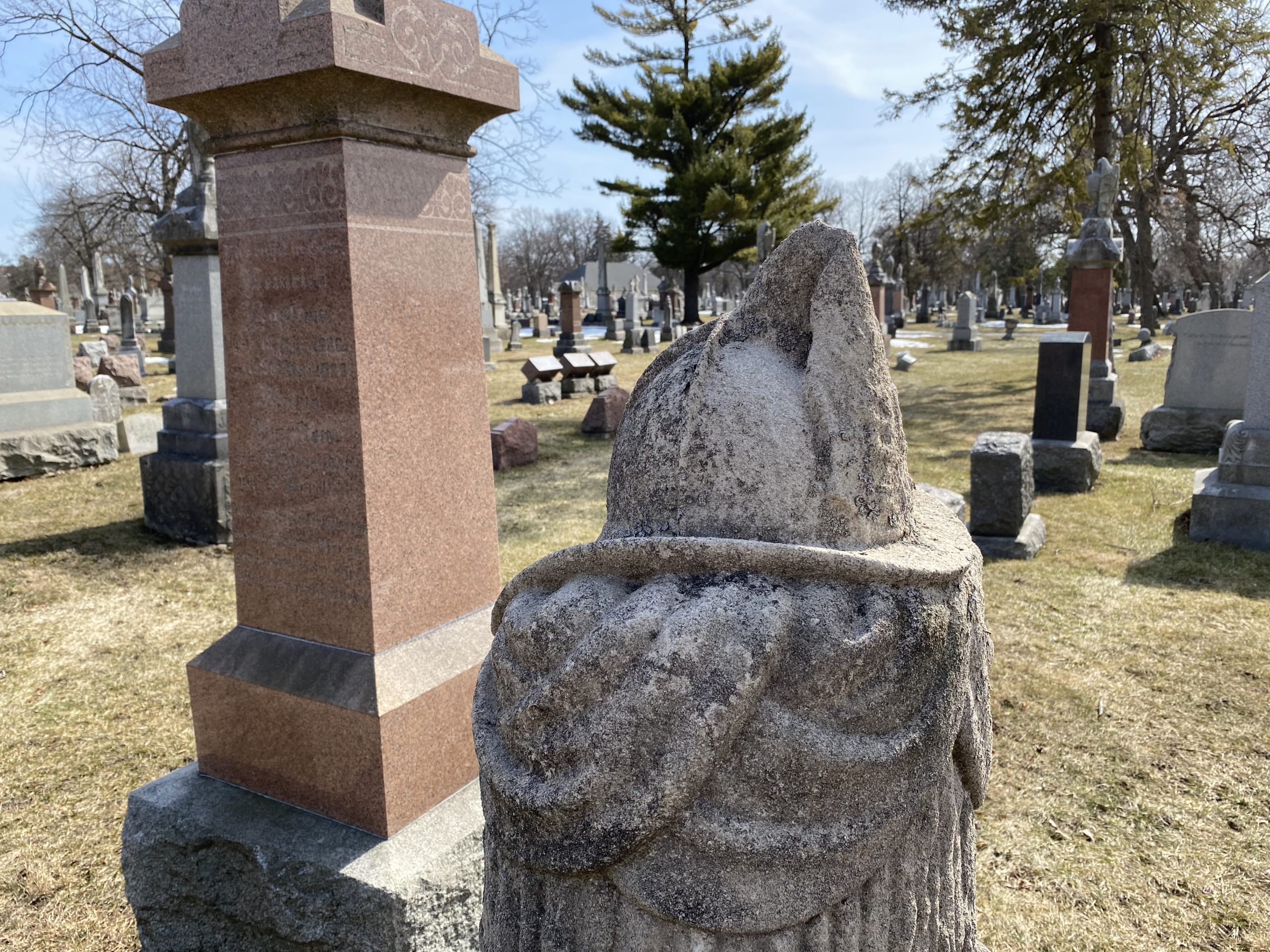Captain, Chicago Fire Deparment
26 January 1849 – 19 December 1903
This fantastic headstone is in the middle of its section – a tree stump hidden in a forest of headstones — and I didn’t spot it after all these years of visits until just this past week. At first glance, it looks like just another tree stump monument but then you see the topper, a carved replica of a fireman’s helmet sitting atop an elaborately draped shroud.
Frank Butterfield was born in Chicago to parents both originally from New York who then divorced when he was quite young. He shared his parents with an older brother and sister, but also had several half-siblings on his father’s side.
It appears as if Frank was moved around some due to this family break-up, and he ended up living with his mother and stepfather in Massachussetts and later with his older sister and her family, also in Massachussetts, for several years. At fourteen, he began a four-year apprenticeship at the Mason Locomotive Works but returned to Chicago after that. His father and older brother both served in the Union Army during the Civil War. His father had remarried and begun his second family when Frank was a small boy, so it’s possible he did not know his father well.
By 1870 Frank was back in Chicago living with and working for his maternal uncle “Pop” Chappell who owned a bar, but the next year he applied to fill one of the vacancies in the Chicago Fire Department. A newspaper item on 3 March 1871 lists this fact, and the very next day on 4 March, 1871, he married Mary Ellen Holmes, beginning his adult life in earnest.
1871 was quite an auspicious year to join the Chicago Fire Department, however, for it was the year of the Great Chicago Fire which began October 8th and burned for three days, destroying thousands of buildings and killing an estimated 300 people. It was the culimation of a terrible fire season owing to severe drought conditions and there had been a higher than usual number of fires in the days leading up to the Great Fire, including one that had burned out of control just the day before and had taken everything the firefighters had to beat it back and prevent it from crossing Adams and running wild.
In spite of this quite literal trial by fire, Frank stuck with his new chosen profession. In June of 1872, now assistant foreman for Engine #1, Frank had his rubber coat burned off in a terrible fire with gas explosions that killed two firemen and badly injured several.
Frank and Ellen’s first child, daughter Francis “Frankie” Bernice, was born in 1872, and by 1873, Frank sustained an injury serious enough to get mentioned in the paper when he was thrown from his engine and run over, badly bruising one leg.
In 1875 he’d become the lieutenant of Engine #24 and was living on West Jackson Street (right about where the Wintrust Bank building is now on the corner of Jackson and Clark – an intersection there is no way Frank would recognize if he time-traveled there from 1875).
 1878 was another big year for Frank, bringing with it his second child, daughter Lillian Cordelia, and a promotion to captain of Engine #24. In 1879, he played a role in detaining a murderer after an argument turned deadly and one young man bashed another in the head with a baseball bat. Frank ended up testifying at the inquest which apparently was held to decide if a murder charge should be brought against the bat-weilder. Sadly, 1879 also saw the loss of baby Lillian who died of a sudden illness just a few weeks before her first birthday. Frank and Ellen had no more children.
1878 was another big year for Frank, bringing with it his second child, daughter Lillian Cordelia, and a promotion to captain of Engine #24. In 1879, he played a role in detaining a murderer after an argument turned deadly and one young man bashed another in the head with a baseball bat. Frank ended up testifying at the inquest which apparently was held to decide if a murder charge should be brought against the bat-weilder. Sadly, 1879 also saw the loss of baby Lillian who died of a sudden illness just a few weeks before her first birthday. Frank and Ellen had no more children.
In 1882 Frank again suffered a leg injury, this time thanks to a horse startling, but again his leg was run over and this time broken. In 1888 he and his men arrived in time to prevent an arson fire (apparently set for the insurance money) from burning down an entire building. In 1893, Frank drove the fire truck across the tracks into the path of an oncoming train and barely avoided being run down (largely thanks to one of the cart-horses who broke free and got himself out of the path of the train, likely preventing the cart from being pulled fully in front of the engine). It sounds very much as if the high drama of going to a fire plus poorly thought-out use of warning and traffic lights led to confusion and nearly several fatalities.
In 1894, Frank was moved from Engine 24 to Engine 64 (still captain) in a massive department shake-up, and in 1902 he was listed along with twenty others whose disability pension was under review. The article about this is a little confusing, and it’s possible Frank had retired but the circumstances of his pension were being reviewed along with those who were being put through disability review. It’s also quite probable that his many injuries had caught up with him by the time he’d reached his early 50s, and he no longer felt up to the physical demands of the job.
It seems likely from subsequent circumstances that he was physically unable to continue working, either from injury or ill health. Though by modern standards still in the prime of life, it’s likely his many injuries and difficult profession had worn him down more than even his contemporaries of the same number of years. For whatever reason, in June of 1903, Frank made out his will. Over the years, he’d acquired bits of land which he left to his wife, daughter Frankie, and son-in-law all separately, along with leaving all other assets and belongings to Ellen. Just a few months later, Frank passed away.
Neither I nor the very good (direct descendant) family researcher whose records were very helpful in my research were able to find an obituary for Frank which seems a pity for someone so often featured in the Tribune to not get a proper send-off. All there is to find is a brief funeral notice.
RIP Captain Butterfield, and thank you for your service.
Please visit my Instagram for any questions or comments on this post!
